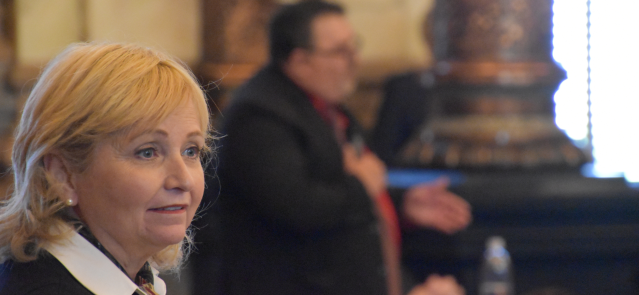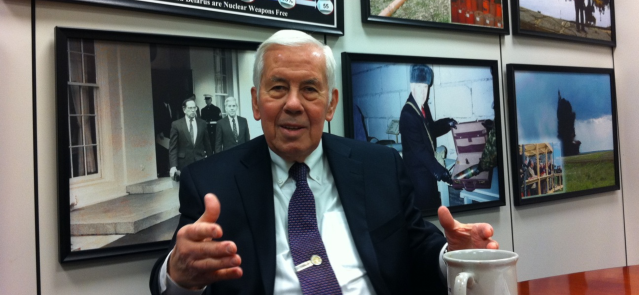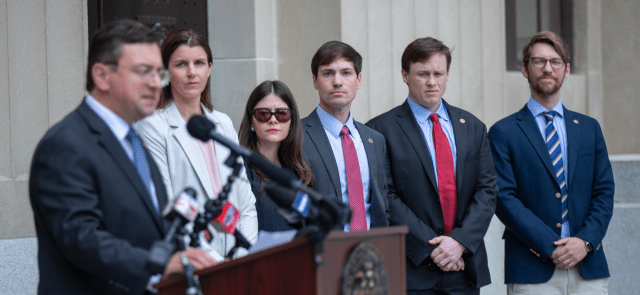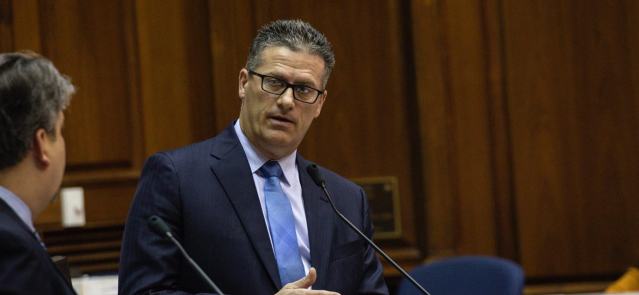Sen. Caryn Tyson on Tuesday questioned the pursuit of federal grant funding for upgraded claims processing software designed to better assist Kansans living with HIV.
Tyson, R-Parker, said her concerns involved the future cost associated with the software rather the system itself.
Tyson’s line of questioning came during a presentation delivered by the Kansas Department of Health and Environment at a meeting convened by the Joint Committee on Information Technology.
The new software system includes a client database and automated medical claim processing module, upgrading its outdated setup, according to the agency’s chief information officer, Bob Doane.
“The goal of the project is to improve the lives of Kansans with HIV,” Doane said of the federally funded dollars tied to the Ryan White Part B Program.
According to the agency’s website, the program is designed to assist individuals with medical case management services, “providing clients with linkages to health, social and wrap-around services from key access points across Kansas.” Some of those services include dental care, medical case management, medications through the statewide AIDS Drug Assistance Program, mental health and substance use services through the Housing Opportunities for Persons With AIDS program and primary care services.
The program was implemented in August 2023 and runs through July 2026, but the current software is lacking, according to Doane. The new client service database, Doane said, is equipped with additional capabilities such as mobile access, automated service reminders, geographic tracking technology, advanced reporting and enhanced security.
Doane added that software upgrades are vital to attracting new health care providers, specifically in rural areas of the state.
“If we cannot attract more providers, we will not be able to improve patient access to treatments,” Doane said. “We could lose federal funding if this project is not completed.”
Tyson took issue with the project cost, which checks in at $2.26 million, plus an additional $400,000 annually for software maintenance. Doane indicated that both figures would be fully covered by federal grant funding and that there’s a “limited time” grant of $6 million that could be used for the project.
“We all know that this may be the project cost, but that’s not the system cost, necessarily,” Tyson countered, while also contending that the acceptance of federal grant funding has come at the expense of local businesses.
Tyson also expressed concern related to the potential for project-related “overruns” and the agency’s ability to keep the scope of the project within the grant dollars secured by the state. She also requested a detailed cost-analysis breakdown.
“Is it going to cost us more in the long run to have this program than what we’re doing in jumping through hoops for the federal money?” she asked. “Sometimes the benefit is, ‘Absolutely, we need it.’ Sometimes it’s, ‘We just see federal money, so we’re going after it whether we need it or not.’”
About 1,900 of the approximately 3,000 documented Kansans living with HIV are enrolled in the program, according to data presented at the meeting. Rep. Barb Wasinger, R-Hays, wondered if there might be a more efficient way to tackle the issue.
“In any case, it just seems like a lot of money,” she said. “We tend to do things for the smallest group — and we have to take care of them. But I think there might be a better way to do it more efficiently.”
Tyson added, “We jump through hoops for federal money not understanding the consequences of what taking that money means. There is a cost or return on investment, and sometimes that is a negative versus a positive.”
Sen. Jeff Pittman, D-Leavenworth, said the program has had a positive impact on the lives of many Kansans.
“The Ryan White program has helped a lot of people in the past, and I’m glad we’re updating it and that we’re able to provide these services,” he said.
Matt Resnick is a statehouse reporter at State Affairs Pro Kansas/Hawver’s Capitol Report. Reach him at [email protected]




